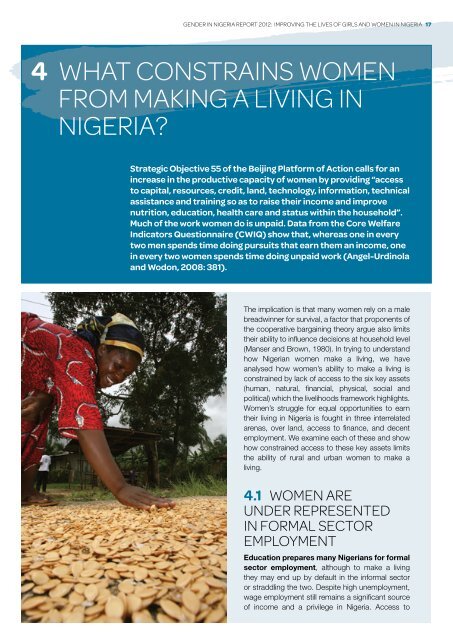Gender in niGeria report 2012 - Economic Commission for Africa
Gender in niGeria report 2012 - Economic Commission for Africa
Gender in niGeria report 2012 - Economic Commission for Africa
You also want an ePaper? Increase the reach of your titles
YUMPU automatically turns print PDFs into web optimized ePapers that Google loves.
<strong>Gender</strong> <strong>in</strong> Nigeria Report <strong>2012</strong>: Improv<strong>in</strong>g the Lives of Girls and Women <strong>in</strong> Nigeria 17<br />
4 WHAT CONSTRAINS WOMEN<br />
FROM MAKING A LIVING IN<br />
NIGERIA?<br />
Strategic Objective 55 of the Beij<strong>in</strong>g Plat<strong>for</strong>m of Action calls <strong>for</strong> an<br />
<strong>in</strong>crease <strong>in</strong> the productive capacity of women by provid<strong>in</strong>g “access<br />
to capital, resources, credit, land, technology, <strong>in</strong><strong>for</strong>mation, technical<br />
assistance and tra<strong>in</strong><strong>in</strong>g so as to raise their <strong>in</strong>come and improve<br />
nutrition, education, health care and status with<strong>in</strong> the household”.<br />
Much of the work women do is unpaid. Data from the Core Welfare<br />
Indicators Questionnaire (CWIQ) show that, whereas one <strong>in</strong> every<br />
two men spends time do<strong>in</strong>g pursuits that earn them an <strong>in</strong>come, one<br />
<strong>in</strong> every two women spends time do<strong>in</strong>g unpaid work (Angel-Urd<strong>in</strong>ola<br />
and Wodon, 2008: 381).<br />
The implication is that many women rely on a male<br />
breadw<strong>in</strong>ner <strong>for</strong> survival, a factor that proponents of<br />
the cooperative barga<strong>in</strong><strong>in</strong>g theory argue also limits<br />
their ability to <strong>in</strong>fluence decisions at household level<br />
(Manser and Brown, 1980). In try<strong>in</strong>g to understand<br />
how Nigerian women make a liv<strong>in</strong>g, we have<br />
analysed how women’s ability to make a liv<strong>in</strong>g is<br />
constra<strong>in</strong>ed by lack of access to the six key assets<br />
(human, natural, f<strong>in</strong>ancial, physical, social and<br />
political) which the livelihoods framework highlights.<br />
Women’s struggle <strong>for</strong> equal opportunities to earn<br />
their liv<strong>in</strong>g <strong>in</strong> Nigeria is fought <strong>in</strong> three <strong>in</strong>terrelated<br />
arenas, over land, access to f<strong>in</strong>ance, and decent<br />
employment. We exam<strong>in</strong>e each of these and show<br />
how constra<strong>in</strong>ed access to these key assets limits<br />
the ability of rural and urban women to make a<br />
liv<strong>in</strong>g.<br />
4.1 Women are<br />
under represented<br />
<strong>in</strong> <strong>for</strong>mal sector<br />
employment<br />
Education prepares many Nigerians <strong>for</strong> <strong>for</strong>mal<br />
sector employment, although to make a liv<strong>in</strong>g<br />
they may end up by default <strong>in</strong> the <strong>in</strong><strong>for</strong>mal sector<br />
or straddl<strong>in</strong>g the two. Despite high unemployment,<br />
wage employment still rema<strong>in</strong>s a significant source<br />
of <strong>in</strong>come and a privilege <strong>in</strong> Nigeria. Access to

















